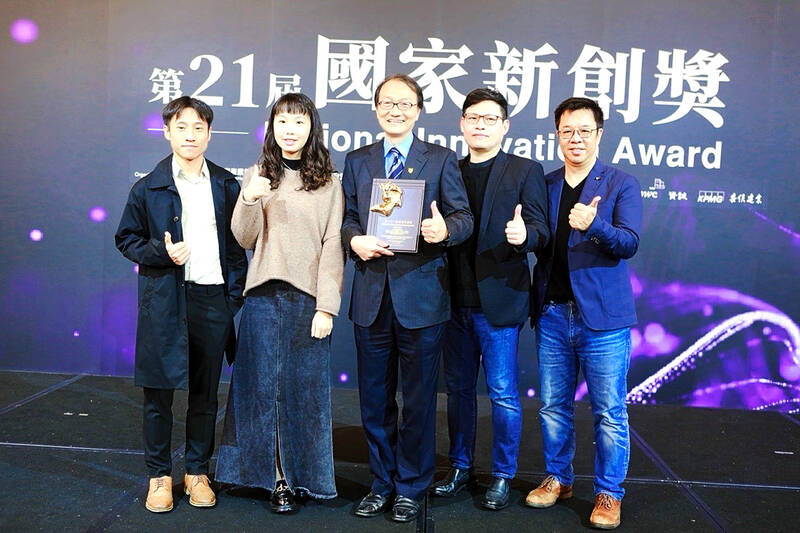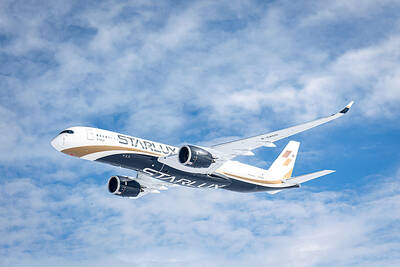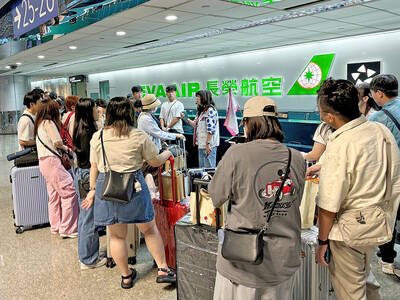Linkou Changung Memorial Hospital has developed a method to monitor gut microbiota-derived metabolites using stool samples, with the method improving the ability to assess the risk of allergies and asthma, and reduce the chances of an attack.
The researchers won the Clinical Innovative Award at the National Innovation Awards for developing the method, the hospital said on Tuesday.
Chiu Chih-yung (邱志勇), a doctor in the hospital’s Department of Pediatric Pulmonology, who headed the research team, said that traditional methods of tracking and detecting allergic diseases relied on clinical assessments and results from allergen-specific immunoglobulin E tests.

Photo courtesy of the Linkou Changung Memorial Hospital
However, such tests are invasive and have questionable accuracy, Chiu said, adding that it was often difficult to regularly draw blood from children.
The team researched associations between gut microbiota and asthma to develop a less invasive method to help diagnose and prevent asthmatic attacks, he said.
The method used nuclear magnetic resonance spectroscopy to accurately analyze short-chain fatty acids, such as ethanoic, propanoic and butyric acid, he said, adding that the team found that butyric acid is critical to maintaining a healthy gut environment and also helps prevent allergens from entering the bloodstream.
The researchers discovered that gut microbiota of asthmatic children was imbalanced, with decreased levels of carbohydrate-active enzymes, which help digest fiber, he said.
The lack of the enzymes limits production of butyric acid, giving allergens a greater chance of entering the bloodstream and causing asthma, Chiu said.
The team’s method was 91 percent more sensitive and showed 82 percent greater specificity than other methods to determine whether children have allergic asthma, he added.
The research was a perfect marriage of high-end metabolite inspection technology and clinical application, Chiu said, adding that it provides new insight and approaches for doctors in pediatric digestive health and allergic asthma risk assessment.

An alleged US government plan to encourage Taiwan Semiconductor Manufacturing Co (TSMC) to form a joint venture with Intel to boost US chipmaking would place the Taiwanese foundry giant in a more disadvantageous position than proposed tariffs on imported chips, a semiconductor expert said yesterday. If TSMC forms a joint venture with its US rival, it faces the risk of technology outflow, said Liu Pei-chen (劉佩真), a researcher at the Taiwan Industry Economics Database of the Taiwan Institute of Economic Research. A report by international financial services firm Baird said that Asia semiconductor supply chain talks suggest that the US government would

Starlux Airlines on Tuesday announced it is to launch new direct flights from Taiwan Taoyuan International Airport to Ontario, California, on June 2. The carrier said it plans to deploy the new-generation Airbus A350 on the Taipei-Ontario route. The Airbus A350 features a total of 306 seats, including four in first class, 26 in business class, 36 in premium economy and 240 in economy. According to Starlux’s initial schedule, four flights would run between Taoyuan and Ontario per week: Monday, Wednesday, Friday and Saturday. Flights are to depart from Taoyuan at 8:05pm and arrive in California at 5:05pm (local time), while return flights

Nearly 800 Indian tourists are to arrive this week on an incentive tour organized by Indian company Asian Painted Ltd, making it the largest tour group from the South Asian nation to visit since the COVID-19 pandemic. The travelers are scheduled to arrive in six batches from Sunday to Feb. 25 for five-day tours, the Tourism Administration said yesterday. The tour would take the travelers, most of whom are visiting Taiwan for the first time, to several tourist sites in Taipei and Yilan County, including tea houses in Taipei’s Maokong (貓空), Dadaocheng (大稻埕) and Ximending (西門町) areas. They would also visit

LITTORAL REGIMENTS: The US Marine Corps is transitioning to an ‘island hopping’ strategy to counterattack Beijing’s area denial strategy The US Marine Corps (USMC) has introduced new anti-drone systems to bolster air defense in the Pacific island chain amid growing Chinese military influence in the region, The Telegraph reported on Sunday. The new Marine Air Defense Integrated System (MADIS) Mk 1 is being developed to counter “the growing menace of unmanned aerial systems,” it cited the Marine Corps as saying. China has constructed a powerful defense mechanism in the Pacific Ocean west of the first island chain by deploying weapons such as rockets, submarines and anti-ship missiles — which is part of its anti-access/area denial (A2/AD) strategy against adversaries — the